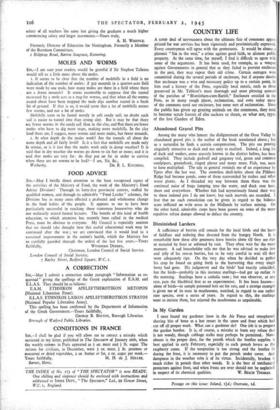COUNTRY LIFE
A GOOD deal of nervousness about the ultimate fate of commons appro- priated for war services has been vigorously and pessimistically expressed. Every countryman will agree with the protestants. It would be almost a platonic " Sin in the soul," a crime against good faith, to alienate public property. At the same time, for myself, I find it difficult to agree with some of the arguments. It has been used, for example, as a weapon against Governments in general that as they failed to prevent enclosure in the past, they may repeat their old crime. Certain outrages were committed during the several periods of enclosure, but if anyone doubts that enclosure was a wise and necessary policy up to a certain point, let him read a history of the Fens, especially local annals, such as those preserved in Mr. Tebbutt's most thorough and most pleasing account of the parishes of "Bluntisham-cum-Earith." Enclosure entailed in the Fens, as in many rough places, reclamation, and even today many of the commons need not enclosure, but some sort of reclamation. Since the public has given up grazing animals on the commons, they tend to become scrub forests of elm suckers or thorn, or what not, types of the lost Garden of Eden.
Abandoned Gravel Pits Among the many who lament the disfigurement of the Ouse Valley by abandoned gravel pits is the author of the book mentioned above ; but as a naturalist he finds a certain compensation. The pits are proving singularly attractive to duck and not only to mallard. Indeed, a long list of duck and waders, some scarcely known in the district before, has been compiled. They include gadwall and garganey teal, green and common sandpipers, greenshank, ringed plover and many more. Fish, too, seem to have multiplied. The tale in general reminds me of an experience by Ypres after the last war. The countless shell-holes about the Pilkhem Ridge had become ponds, some of them surrounded by rushes and other water plants. As I threaded my way between them there was the continual noise of frogs jumping into the water, and duck rose here, there and everywhere. Whether fish had mysteriously found their way to these isolated pits I do not know, but such marvels are recorded. I fear that no such consolation can be given in regard to the hideous scars inflicted on wide areas in the Midlands by surface mining. On the other hand, admirable crops have been grown on some of the more repulsive refuse dumps allowed to deface the country.
Diminished Larders A sufficiency of berries still remain for the local birds and the hosts of fieldfare and redwing that descend from the hungry North. It is remarkable how these able gourmets leave berries alone till they are ripe or matured by frost or softened by rain. They often wait for the exact moment. A sad householder tells me that he was advised to make jam and jelly of his rowan berries, but to be very careful to wait till they were adequately ripe. On the very day when he decided to gather his crop he found on going forth to the harvesting that every single berry had gone. His judgement and the birds' had exactly coincided, but the birds—probably in this instance starlings—had got up earlier in the morning. Starlings have a catholic taste ; but one observer, at any rate, puts the blackbird first as an experimenter. It has been known— alone of birds—to sample poisoned bait set for rats, and a strange example is given me of its taste in mushrooms, watched, in regard to one rather rare species, over a series of years. In regard to this, the starlings went to imitate them, but rejected the mushrooms as unpalatable.
In My Garden I once found my gardener (now in the Air Force and unreplaced) shaving bits of bone as a last resort in the snow and frost which had cut off all proper work. What can a gardener do? One job is to prepare the garden bonfire. It is, of course, a mistake to burn any refuse that is not woody, though cabbage stalks may perhaps be permitted.- Now- abouts is the proper date, for the potath which the bonfire supplies is best applied in early February, especially to such potash lovers as the raspberry canes. If the temptation is too strong and the bonfire lit during the frost, it is necessary to put the potash under cover. Any dampness in the weather robs it of its virtue. Incidentally, bracken is much richer in potash than other weeds. It is the best of mechanical protectors against frost, and when frosts are over should not be neglected
Postage on this issue: Inland, rid.; Overseas, Id.


























 Previous page
Previous page